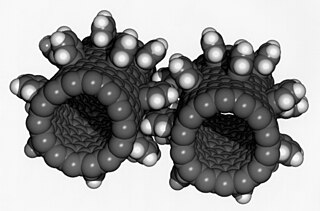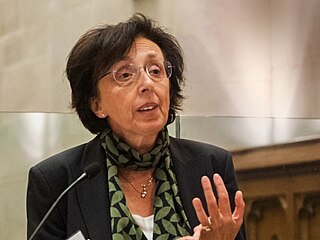Related Research Articles
The Foresight Institute (Foresight) is a San Francisco-based research non-profit that promotes the development of nanotechnology and other emerging technologies, such as safe AGI, biotech and longevity.

Nanotechnology, often shortened to nanotech, is the use of matter on atomic, molecular, and supramolecular scales for industrial purposes. The earliest, widespread description of nanotechnology referred to the particular technological goal of precisely manipulating atoms and molecules for fabrication of macroscale products, also now referred to as molecular nanotechnology. A more generalized description of nanotechnology was subsequently established by the National Nanotechnology Initiative, which defined nanotechnology as the manipulation of matter with at least one dimension sized from 1 to 100 nanometers (nm). This definition reflects the fact that quantum mechanical effects are important at this quantum-realm scale, and so the definition shifted from a particular technological goal to a research category inclusive of all types of research and technologies that deal with the special properties of matter which occur below the given size threshold. It is therefore common to see the plural form "nanotechnologies" as well as "nanoscale technologies" to refer to the broad range of research and applications whose common trait is size.
The Center for Nanophase Materials Sciences is the first of the five Nanoscale Science Research Centers sponsored by the United States Department of Energy. It is located in Oak Ridge, Tennessee and is a collaborative research facility for the synthesis, characterization, theory/ modeling/ simulation, and design of nanoscale materials. It is co-located with Spallation Neutron Source.

Nanotechnology education involves a multidisciplinary natural science education with courses such as physics, chemistry, mathematics and molecular biology. It is being offered by many universities around the world. The first program involving nanotechnology was offered by the University of Toronto's Engineering Science program, where nanotechnology could be taken as an option.

Armand Paul Alivisatos is an American chemist and academic administrator who has served as the 14th president of the University of Chicago since September 2021. He is a pioneer in nanomaterials development and an authority on the fabrication of nanocrystals and their use in biomedical and renewable energy applications. He was ranked fifth among the world's top 100 chemists for the period 2000–2010 in the list released by Thomson Reuters.
The history of nanotechnology traces the development of the concepts and experimental work falling under the broad category of nanotechnology. Although nanotechnology is a relatively recent development in scientific research, the development of its central concepts happened over a longer period of time. The emergence of nanotechnology in the 1980s was caused by the convergence of experimental advances such as the invention of the scanning tunneling microscope in 1981 and the discovery of fullerenes in 1985, with the elucidation and popularization of a conceptual framework for the goals of nanotechnology beginning with the 1986 publication of the book Engines of Creation. The field was subject to growing public awareness and controversy in the early 2000s, with prominent debates about both its potential implications as well as the feasibility of the applications envisioned by advocates of molecular nanotechnology, and with governments moving to promote and fund research into nanotechnology. The early 2000s also saw the beginnings of commercial applications of nanotechnology, although these were limited to bulk applications of nanomaterials rather than the transformative applications envisioned by the field.
The Feynman Prize in Nanotechnology is an award given by the Foresight Institute for significant advances in nanotechnology. Two prizes are awarded annually, in the categories of experimental and theoretical work. There is also a separate challenge award for making a nanoscale robotic arm and 8-bit adder.
The following outline is provided as an overview of and topical guide to nanotechnology:
Steven Gwon Sheng Louie is a computational condensed-matter physicist. He is a professor of physics at the University of California, Berkeley and senior faculty scientist in the Materials Sciences Division at Lawrence Berkeley National Laboratory, where his research focuses on nanoscience. He is also scientific director of the Theory of Nanostructured Materials Facility at the Molecular Foundry.
Uzi Landman is an Israeli/American computational physicist, the Fuller E. Callaway Professor of Computational Materials Science at the Georgia Institute of Technology.
Quantum nanoscience is the basic research area at the intersection of nanoscale science and quantum science that creates the understanding that enables development of nanotechnologies. It uses quantum mechanics to explore and use coherent quantum effects in engineered nanostructures. This may eventually lead to the design of new types of nanodevices and nanoscopic scale materials, where functionality and structure of quantum nanodevices are described through quantum phenomena such as superposition and entanglement. With the growing work toward realization of quantum computing, quantum has taken on new meaning that describes the effects at this scale. Current quantum refers to the quantum mechanical phenomena of superposition, entanglement and quantum coherence that are engineered instead of naturally-occurring phenomena.
The International Society for Nanoscale Science, Computation, and Engineering is a scientific society specializing in nanotechnology and DNA computing. It was started in 2004 by Nadrian Seeman, founder of the field of DNA nanotechnology. According to the society, its purpose is "to promote the study of the control of the arrangement of the atoms in matter, examine the principles that lead to such control, to develop tools and methods to increase such control, and to investigate the use of these principles for molecular computation, and for engineering on the finest possible scales."
The International Institute for Nanotechnology (IIN) was established by Northwestern University in 2000. It was the first institute of its kind in the United States and is one of the premier nanoscience research centers in the world. Today, the IIN represents and unites more than $1 billion in nanotechnology research, educational programs, and supporting infrastructure.

Nicole Grobert FRSC FYAE is a German-British materials chemist. She is a professor of nanomaterials at the Department of Materials at the University of Oxford, fellow of Corpus Christi College, Oxford, and a Royal Society industry fellow at Williams Advanced Engineering. Grobert is the chair of the European Commission's Group of Chief Scientific Advisors.

Giulia Galli is a condensed-matter physicist. She is the Liew Family Professor of Electronic Structure and Simulations in the Pritzker School of Molecular Engineering and the Department of Chemistry at the University of Chicago and senior scientist at Argonne National Laboratory. She is also the director of the Midwest Integrated Center for Computational Materials. She is recognized for her contributions to the fields of computational condensed-matter, materials science, and nanoscience, most notably first principles simulations of materials and liquids, in particular materials for energy, properties of water, and excited state phenomena.

Nguyễn Thị Kim Thanh is a Professor of Nanomaterials at University College London. She was awarded the 2019 Royal Society Rosalind Franklin Award for her research and efforts toward gender equality.
Caterina Ducati is a Professor of Nanomaterials in the Department of Materials at the University of Cambridge. She serves as Director of the University of Cambridge Master's programme in Micro- and Nanotechnology Enterprise as well as leading teaching in the Nanotechnology Doctoral Training Centre.

Elena Besley is a British scientist who is Professor of Theoretical and Computational Chemistry at the University of Nottingham. She holds a Royal Society Wolfson Fellowship and is Associate Editor of Nano Letters.
Ali Enver Aliev is a Crimean Tatar American physicist, research professor at the NanoTech Institute, and adjunct professor at Physics Department, The School of Natural Sciences and Mathematics, University of Texas at Dallas. In 2011 he was recognized an “Inventor of the year” by Time magazine His fields of current research interest are nanoscience and nanotechnologies, electrochromism and acoustics. He holds a number of invention patents from the United States Patent and Trademark Office (USPTO).
References
- ↑ Bill Condie (23 April 2015). "Australian becomes first woman to win the Feynman Prize for Nanotechnology — Cosmos Newsblog". Blog.cosmosmagazine.com. Archived from the original on 19 May 2015. Retrieved 19 May 2015.
- ↑ "Dr Amanda Barnard". people.csiro.au. Archived from the original on 21 July 2019. Retrieved 2 March 2017.
- ↑ "Dr Amanda Barnard, computational physicist | Australian Academy of Science". www.science.org.au. Retrieved 2 March 2017.
- 1 2 "2009 Malcolm McIntosh Prize for Physical Scientist of the Year award citation". 2009 Prime Minister’s Prizes for Science. Department of Industry and Science, Australian Government. Archived from the original on 21 February 2011. Retrieved 14 October 2018.
- ↑ "Australia Day 2022 Honours List". Sydney Morning Herald. Nine Entertainment Co. 25 January 2022. Retrieved 25 January 2022.
- ↑ Lehmann, Emily (23 April 2015). "Nanotech prize: No small win for Australia and women in science". CSIRO's news blog. Archived from the original on 19 May 2015. Retrieved 23 April 2015.